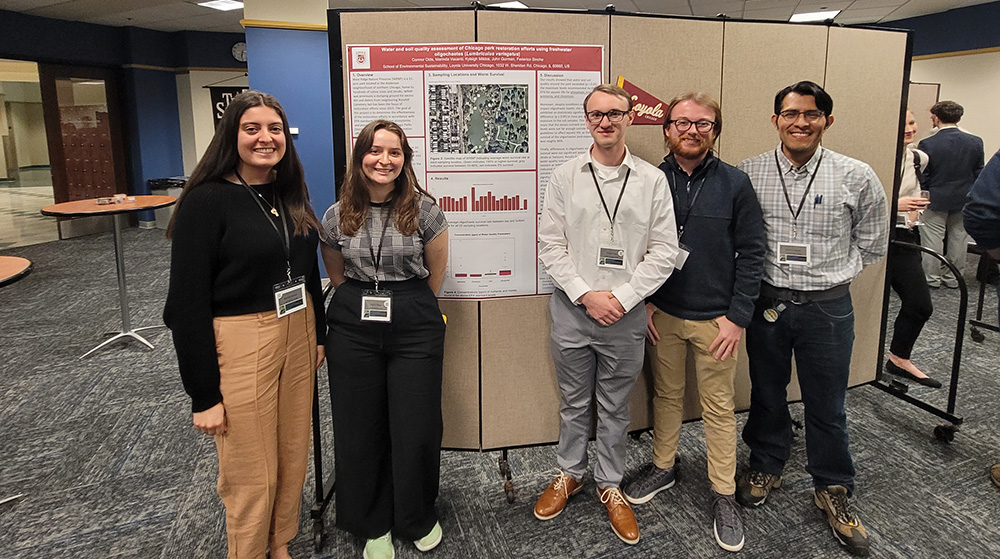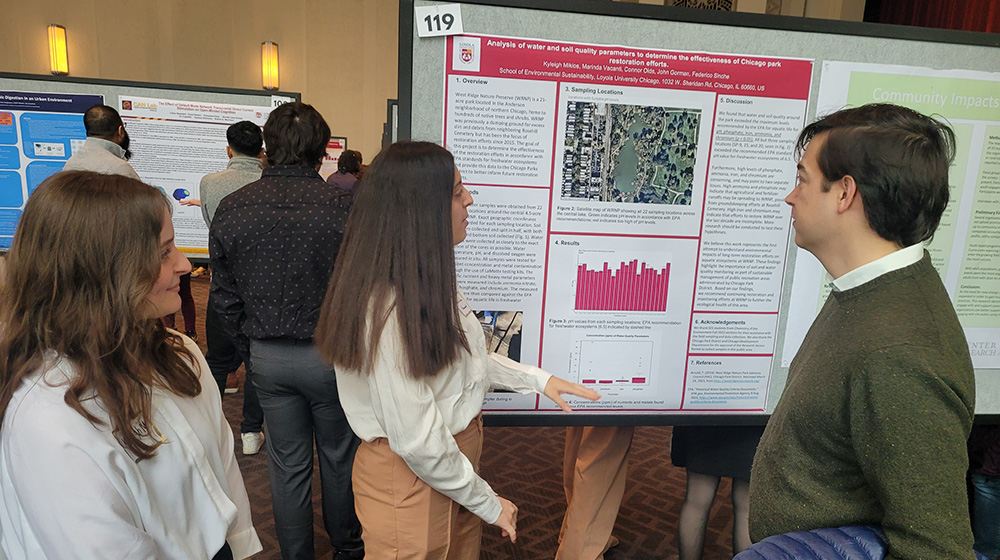Sinche-student-research
Student Research Contributes to Local Ecological Restoration

Miranda Vacanti, Cyleigh Miklos, Conner Olds, and John Gorman with Federico Sinche, PhD, (right) at the annual meeting of the Midwest Society of Environmental Toxicology and Chemistry
A small project that began in a School of Environmental Sustainability (SES) classroom has turned into something bigger with the potential to create positive change in Chicagoland public areas. It all started in the fall of 2022 when SES students in the Chemistry of the Environment course went with their instructor, Federico Sinche, PhD, to West Ridge Nature Park in Chicago as part of their lab coursework. Four students—Connor Olds, Marinda Vacanti, Kyleigh Miklos, and John Gorman—continued the work beyond the assigned course activities. They wrote up and presented the research that started with the class project, and the results could help inform future ecological restoration efforts.
West Ridge Nature Park was once a dumping ground for waste from the neighboring Rosehill Cemetery, and it has been the subject of ecological restoration endeavors since 2015. To assess the progress, the team of four students analyzed water samples from the park’s 4.5-acre pond and tested the surrounding soil for nutrient content and heavy metals. The results were then compared to Environmental Protection Agency (EPA) standards for freshwater ecosystems.
The team’s analysis produced some alarming preliminary results, revealing phosphate, iron, ammonia, and chromium levels well outside the recommended ranges or values defined by the EPA. These findings indicate that additional restoration and monitoring efforts are necessary to bring the park’s ecosystem back into balance.
The team’s excellent research and dedication to the project earned them opportunities to present their findings at the Midwest Society of Environmental Toxicology and Chemistry (SETAC) conference and Loyola’s Undergraduate Research and Engagement Symposium in April.

Miranda Vacanti and Kyleigh Miklos discussing their research at Loyola's Undergraduate Research and Engagement Symposium
Presenting at these events allowed the team to showcase their work in a professional setting, a privilege not commonly extended to undergraduates. This experience also allowed them to witness cutting-edge research being conducted by leaders in the field, exposing them to diverse projects in environmental sciences and sustainability. Conducting the study itself was only one aspect of the team’s journey. They also presented their findings in a manner that captivated and engaged the audience.
The team’s participation in the conferences fueled their enthusiasm to continue their research endeavors in the future. The interest generated by their findings, as well as the chance to engage with other researchers, has motivated them to pursue further investigations. Two team members plan to attend graduate school, and the research experience gained during their undergraduate years will undoubtedly give them a head start in their future research pursuits.
The team hopes their research will contribute to the Chicago Park District’s ongoing restoration efforts at West Ridge Nature Park and inspire other students to embark on their own research journeys. With a passion for environmental science and a determination to make a difference, this ambitious team has set a great example for future generations of Loyola students.
Story by Jorge Haddad
A small project that began in a School of Environmental Sustainability (SES) classroom has turned into something bigger with the potential to create positive change in Chicagoland public areas. It all started in the fall of 2022 when SES students in the Chemistry of the Environment course went with their instructor, Federico Sinche, PhD, to West Ridge Nature Park in Chicago as part of their lab coursework. Four students—Connor Olds, Marinda Vacanti, Kyleigh Miklos, and John Gorman—continued the work beyond the assigned course activities. They wrote up and presented the research that started with the class project, and the results could help inform future ecological restoration efforts.
West Ridge Nature Park was once a dumping ground for waste from the neighboring Rosehill Cemetery, and it has been the subject of ecological restoration endeavors since 2015. To assess the progress, the team of four students analyzed water samples from the park’s 4.5-acre pond and tested the surrounding soil for nutrient content and heavy metals. The results were then compared to Environmental Protection Agency (EPA) standards for freshwater ecosystems.
The team’s analysis produced some alarming preliminary results, revealing phosphate, iron, ammonia, and chromium levels well outside the recommended ranges or values defined by the EPA. These findings indicate that additional restoration and monitoring efforts are necessary to bring the park’s ecosystem back into balance.
The team’s excellent research and dedication to the project earned them opportunities to present their findings at the Midwest Society of Environmental Toxicology and Chemistry (SETAC) conference and Loyola’s Undergraduate Research and Engagement Symposium in April.
Presenting at these events allowed the team to showcase their work in a professional setting, a privilege not commonly extended to undergraduates. This experience also allowed them to witness cutting-edge research being conducted by leaders in the field, exposing them to diverse projects in environmental sciences and sustainability. Conducting the study itself was only one aspect of the team’s journey. They also presented their findings in a manner that captivated and engaged the audience.
The team’s participation in the conferences fueled their enthusiasm to continue their research endeavors in the future. The interest generated by their findings, as well as the chance to engage with other researchers, has motivated them to pursue further investigations. Two team members plan to attend graduate school, and the research experience gained during their undergraduate years will undoubtedly give them a head start in their future research pursuits.
The team hopes their research will contribute to the Chicago Park District’s ongoing restoration efforts at West Ridge Nature Park and inspire other students to embark on their own research journeys. With a passion for environmental science and a determination to make a difference, this ambitious team has set a great example for future generations of Loyola students.
Story by Jorge Haddad
